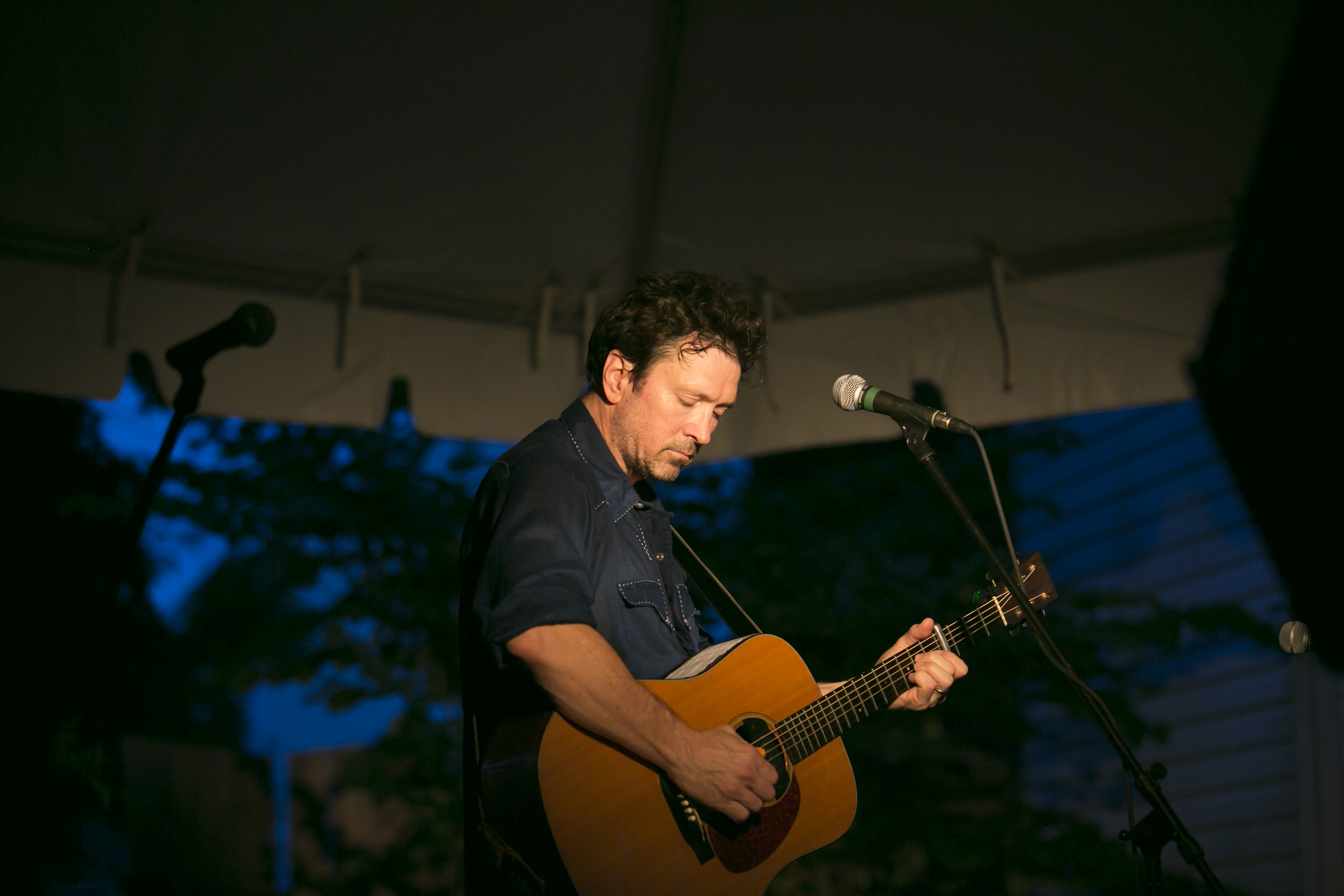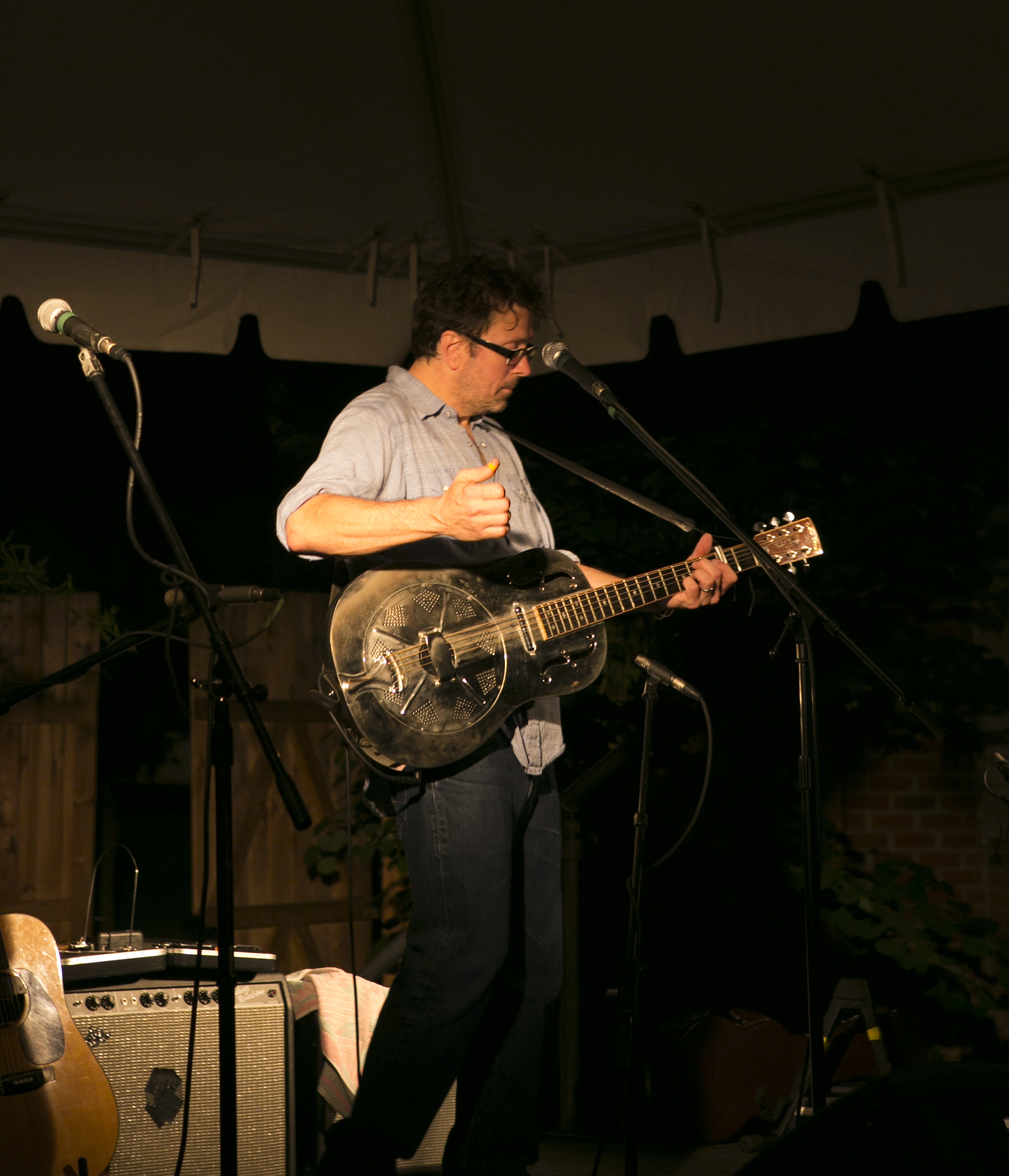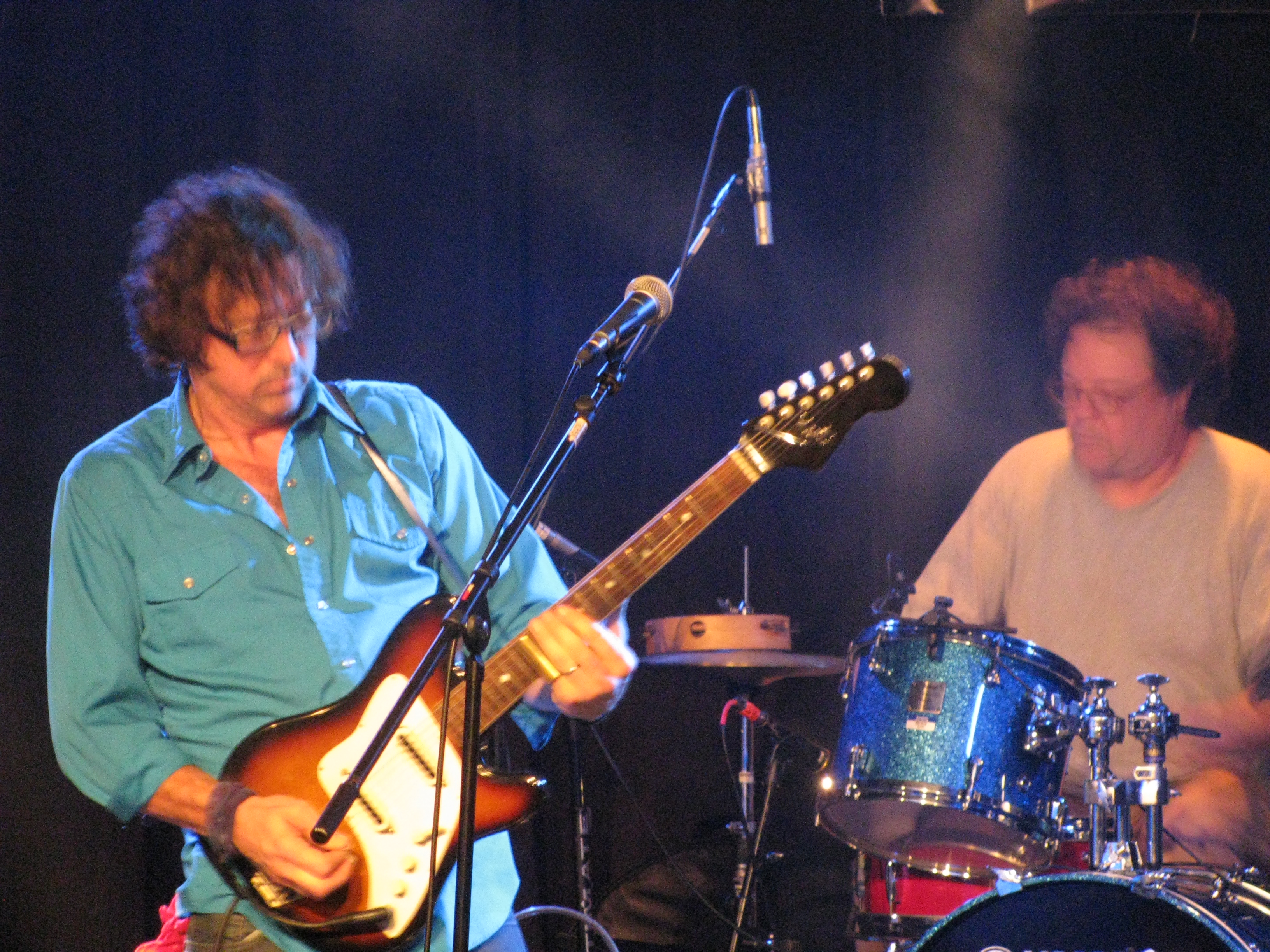
Will Kimbrough performing solo at a house concert in Richmond VA, June 2012. Photo credit: Jacob Aaron.
Will Kimbrough is a triple-threat: A seasoned songwriter, acclaimed multi-instrumentalist, and master showman. Then again, you could say he’s much more than just a triple-threat. He’s also a great singer, and most importantly, an incredibly nice guy. Countless musicians have enlisted him to play on their recordings. He’s toured with Rodney Crowell and Emmylou Harris, had his songs recorded by Jimmy Buffett… The list goes on and on.
We approached him before a dynamite 3-plus hour solo concert on March 8, 2013 at Ashland Coffee & Tea in Ashland, VA. He graciously answered our questions and offered up some wisdom, Yoda style.
Jeff: When did you first start playing music?
Will: I started playing guitar when I was twelve. For my 12th birthday I got a guitar, and I guess I started then. I played piano a little bit before that, and I played violin a little bit before that, so… you know, 11… 37 years ago.
Brian: Since you’re such a multi-instrumentalist, if there was a deserted island instrument, what would it be for you?
Will: Oh, I’d probably take a… If I was gonna be on a desert island, all alone with a guitar, I’d take a little old Gibson, or a little old Martin; a triple-o, a double-o, or a L-double o, LG2 Gibson…
Jeff: Do you have one?
Will: No.
Jeff: Well, maybe there’d be one stashed away on the island…
Will: If I could take one, and it didn’t have all the cracks in it, I’d take my Martin D-18.
Jeff: I was gonna say a Les Paul and a Marshall stack, ‘cause I’m sure they’ll have electricity on the island.
Will: (laughs) Right.
Jeff: You’ve played with a lot of musicians. But is there anybody who you haven’t played with, who you would really like to play with?
Will: Oh, sure. There’s all kinds of people… Gosh, there’s a lot. I mean, some of the people I’d love to play with have passed away, many of them.
Jeff: I mean, preferably a living person.
Will: I’d love to play with Ry Cooder… I love Ry Cooder and David Lindley, I love a whole bunch of African guitar players, that I’d love to sit in a room with and play, ‘cause they have a different thing… And, you know, tons of different people, but… I mean, I’ve gotten to play with a lot of people, and a lot of people that nobody would have ever heard of. I’d love to play, like, Chuck Berry rhythm with Keith Richards, all day.
Jeff: How about someone who… maybe I should have asked the question a different way…
Will: Okay.
Jeff: More specifically someone who is, you know… in a genre that you may not usually play in.
Will: Oh, right. Okay. Jim Hall… jazz guitar player. He’s still around, and I’d love to play with him. He’s in his eighties, but he still plays really well. No offense to you octogenarians out there… I didn’t mean to presume that they couldn’t play well. But um…
Jeff: B.B. King…
Brian: Who else?
Will: Sonny Rollins… sax player… Jim Hall, jazz great, been playin’ forever, and he still plays great, and he has a unique thing that I cannot possibly do.
Brian: Yeah. Very cool.
(Brian): When was your first paying gig?
Will: I was twelve, and they used to have bands at skating rinks in Mobile (Alabama, Will’s hometown), roller-skating places, on Saturday night. So, in December of 1976, which was six months after I got a guitar, we played in Skate World, in Mobile, Alabama, and…
Jeff: That must have been interesting.
Will: …We made a hundred and fifty bucks.
Jeff: That’s a lot for a first paying gig.
Will: That’s what they paid. They paid everybody 150 bucks, and so, it didn’t matter. We talked ‘em into booking us, and it was… actually, that was my first gig. I got paid the first gig, so of course I got hooked right into it, you know?
Brian: Oh yeah, definitely. “There’s money in this”!
Will: Twenty years later I was still making a hundred and fifty bucks! (laughs)
Jeff: Well…
Will: It’s okay!
Jeff: Steady job…
Will: Yeah, that’s right!
Brian: That might be kind of dangerous, though, for the skaters ‘cause… they’d start weaving with the music, and then… bashing into people…
Will: Well, they kinda… yeah, it was dangerous. They quit doin’ it pretty quickly.
Brian: Yeah.
Will: We got the heyday of the skating/rock ‘n’ roll combination.
Jeff: Is there any advice you can give to musicians who are just journeying into the music business?
Will: Yeah! Well, if you have expectations about any part of it, try to get rid of ‘em. And then you’ll get new ones, but you just have to constantly… If you destroy your expectations as quickly as possible, you’ll save yourself a lot of getting your feelings hurt. I’m not talking about success or money, I’m talking about everything; your ability to play. Your ability to play what’s in your head. You just have to keep trying, I mean… The reason I play multiple instruments is ‘cause I’m willing to play badly in front of an expert. Honestly! And just do it! Because you have to learn. And once you’re in the swing of everything and you’re not learning at home as much anymore, you’re just out playing. So you get an instrument and you take it onstage and just work on it, you know? Otherwise you’re waiting five years until you’re good enough, and then…
Fear and expectations are a real enemy. And I’m saying that, I think, because I just let go of a bunch of expectations, and I realized as soon as I did, that I started to get new ones. Just about, like, what to expect from other people, for one thing, in general. Not that it’s a cynical thing, that other people aren’t going to do you right, but only you know what you want. And only you know when you’re getting it; other people can never tell you that you’re getting what you want out of life; I’m just talking in general… Your time, your schedule, tour schedule, studio schedule…
You have to stand up for yourself, and you have to tell people honestly, “no, that doesn’t make me comfortable”, or “this is how much it costs for me to do this thing”. And if you’re afraid that they’ll say “oh, well that’s too much, I’m gonna hire somebody else”, and so you don’t say it, then you’re not representing yourself. You have to be willing… If something’s making your stomach turn, but you’re trying to make a living playing music, you shouldn’t just take it just ‘cause you’re afraid of being broke.
That’s what I’m saying. But… Try to look with clear eyes, and there’s all kind of different ways to look at it throughout your life. I mean there’s when you’re just getting started, and you’re just grateful that anybody will let you play anywhere. And then there’s a little bit where you get to where people are comin’ out and showin’ up, and then your expectations will be, like, you expect people to come at that point, because they have been. Then there’ll be a night where they don’t. And you’re crushed, you know? Or you get a job with somebody that you admire, and you expect them to do something that you dreamed of, and it turns out they’re just people. They’re just people with an extraordinary gift.
So, there’s always the twenty-two hours of the day that you travel around to get to a gig, and then there’s two hours that you’re actually playing the show. And that’s all you get of the wonderfulness. (laughs) You know what I’m sayin’?
Jeff: “Is this two hours worth it?”
Will: Well, you know, what is your time worth to you? And it’s not just a monetary thing, it’s a spiritual thing, you know… Where do you want to go with your music? Because… the future started five minutes ago, you know. I mean… For me, the future started forty years ago.
It’s like… Don’t hesitate to put your music out if your record feels like it’s done… You don’t feel like you have enough money to hire a publicist, or a radio promotion or whatever. Don’t hesitate. Press the CDs up, take ‘em to the gig, give ‘em away to people that you think can help you… I have a lot of advice.
Jeff: Yeah.
Will: But, honestly… I’m not saying “give it away on the Internet”, or whatever, that’s such a cliché… and that’s fine if you wanna do that… But it’s not expensive to make a good sounding record, and it’s not expensive to make good looking artwork, and it’s not expensive to press up some CDs and then give ‘em to people and sell ‘em at your shows. And then your songs are out there in the public.
I mean, I wouldn’t have gotten my first Jimmy Buffett cut ten years ago if I hadn’t made a CD that I couldn’t afford to make, really, and put it out, and he got my record and he liked it, and he wanted to cut a song. He didn’t want to cut a song by a songwriter who pitched him a song, you know what I mean?
I just finished recording the fourth album in a row with him. I got a four-album, ten-year writing and recording relationship with Buffett and the guys in his band. And it started because I made a record that I put out, instead of waiting because I didn’t think I could, you know what I mean? And I’ve just gone through that again where I thought I couldn’t, and I haven’t put it out yet, but I’m finishing it now. Because I know that it’s more like you can’t afford not to put your music out there. ‘Cause people need to hear the songs.
You know, somebody who was texting me this morning was talking about a song we wrote and recorded on her album, and she was like “I wish I could have sang it better, I wish we didn’t have to do it on one-inch, eight-track tape”, and I was like “What are you, nuts?! That was the best sounding thing we ever did!”. We sang a duet into one mic and did it live. And people have that forever on a record, instead of us, like, nitpicking it together on a computer.
Jeff: Right, “I wish I could change that.”
Brian: Imagine all the great albums out there… I’m sure as soon as it was released, Neil Young said something like, “Oh, I hate my vocals on… ‘Ambulance Blues’”
Will: (laughs) That’s a good one.
Brian: Exactly, like… “I wish I could go back and redo ‘em”… They’re amazing!
Will: Well, I’ll say this, some other advice for people:
When you’re makin’ your own record, listen to your favorite records and try to listen fairly, listen to those Beatles records – like, listen to when the bass goes high on “Hey, Jude”, and it’s way out of tune… (sings bass line)… “Let it out and let it in…”. It’s totally sharp, like… six cents sharp. But you know what? No one has ever cared. Which isn’t to say you should make your albums out of tune. But the spirited performance that sounds good always should win out over technical perfection that sounds good to the engineer.
Jeff: I definitely agree with you.
Brian: Were The Band’s harmonies ever always on key, like, all the time?
Will: No, but that’s the whole…
I’m trying to take my own advice, is the interesting thing, like… You learn stuff and then you… Your life changes and then you have to learn it all over again, every time, for each phase of your life.
Jeff: Yeah, it’s interesting, sometimes it seems like that, like… “Didn’t I already figure that out? Shouldn’t I already know that?…
Brian: That happens all too often to me.
Jeff: …Do you really have to learn all over again?”
Will: I think you do. Because I learned a lot as a band member, and then I had to learn it as an individual, and then I had to learn it as a sideman… I had to learn it as a session player… I had to learn it as a writer, and I had to learn it as a guy that put his own record out. I had to learn it as a guy who had a record deal. I had to learn it as a guy who had a major label record deal. I had to learn it as a guy who had an independent record deal, and I had to learn it again as a guy who put his own record out. I had to learn it as a guy who writes songs in a publishing deal. I had to learn it as a guy with no publishing deal… and it never ends. But if you can just jump right into it when it’s in front of you, and not be afraid, and ask questions. Instead of acting like you know what you’re doing just, like “Man, I don’t know what you’re talking about. What are you talking about? Show me! Make it easy for me. Help me out here.”


